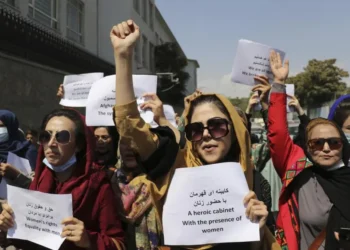Human Lives Human Rights: The Sudan crisis has led to the displacement of more than four million individuals, as stated by the UN refugee agency on Tuesday. The agency expressed its concern about the impact of the conflict on healthcare services.
With the rising count of displacements, William Spindler from the UNHCR expressed profound concern about the worsening health conditions across the nation, encompassing refugee camps. He conveyed this worry during a UN press conference held in Geneva.
“The conditions within Sudan, where UNHCR teams are actively present, are unsustainable due to the overwhelming needs that surpass what can be feasibly provided with the resources at hand,” remarked Spindler.
Within the region of White Nile, the provision of health and nutrition services is greatly compromised across all 10 refugee camps. This dire situation arises from a scarcity of vital medicines, personnel, and necessary provisions.
Spindler further pointed out that this issue is compounded by the recent arrival of more than 144,000 newly displaced refugees from Khartoum. These newcomers are joining the ranks of existing South Sudanese refugees and local communities who rely on these clinics for their healthcare needs.
According to Spindler, the comprehensive count of displaced individuals encompasses 700,000 refugees and asylum-seekers who sought refuge in neighboring nations, along with 195,000 South Sudanese who were compelled to repatriate to their homeland.
Within Sudan, there are over three million internally displaced individuals, which includes 187,000 refugees who were present in the country when the crisis began.
Many families, having been on the move for weeks with limited food and medicine, continue to face rising malnutrition rates, disease outbreaks, and related deaths.
A notable concern is the report of over 300 deaths, mainly affecting children under 5 years old, due to measles and malnutrition between May 15 and July 17.
The lack of essential medicines, personnel, and supplies is significantly hindering the provision of health and nutrition services.
Additionally, there is a warning of the likelihood of severe cholera and malaria outbreaks in the coming months due to flooding.
Since the conflict’s initiation in April, the health and nutrition condition of those crossing from Sudan to South Sudan and Chad has rapidly deteriorated.
The situation across borders is equally dire, with the health sector and healthcare professionals facing attacks. Between April 15 and July 31, there were 53 reported attacks on healthcare.
The World Health Organization’s Christian Lindmeier emphasized the urgent need for attacks on healthcare to cease and stressed the importance of ensuring safety for humanitarian workers delivering essential services.
The conflict between the army and the Rapid Support Forces since April has inflicted considerable damage on Sudan, resulting in the deaths of more than 3,000 civilians and leaving thousands injured, as per local medics.


















